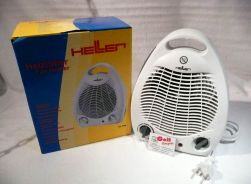Categories: Featured Articles » Sharing experience
Number of views: 44595
Comments on the article: 3
Advantages and disadvantages of the Veterok heater
 Surely you know the Veterok heater. By the way, “Veterok” is not a name, but the principle of operation of this device. Like oil or spiral electric heaters (calorifiers), Veterok has a larger efficiency.
Surely you know the Veterok heater. By the way, “Veterok” is not a name, but the principle of operation of this device. Like oil or spiral electric heaters (calorifiers), Veterok has a larger efficiency.
An indisputable plus, when using this device, is, of course, its speed. After turning on the heater, it instantly begins to warm the air.
Why is the "Breeze"? The principle of action speaks for itself. A heating element (spiral), a fan, a regulator of heating levels, and a power regulator are mounted in a plastic case with holes for air diffusion. As a rule, there are three levels of heating: cold air, warm and hot.
Another not unimportant plus of this electric heater is its size. The "breeze" is not very large, which allows you to place it anywhere, the main thing is that there would be no barriers and quickly flammable elements nearby. The spiral is still inside.
Warming up the air to a certain temperature, the "Breeze" is turned off. Then, having “decided” that it is time to warm the air, it turns on again. Some heaters of this type do not have the ability to turn off themselves, which is a very serious minus during their operation.
So, the main disadvantage of the Veterok heater is that it simply dries the air, and so much so that it starts to not even hurt, but to crack its head. And this is not pleasant.
When I worked part time at a gas station, such a device really got me, and not only helped me out on cold winter nights. He heated the komorka two by two meters so much that if I still managed to lie down, I woke up wet and with a headache, went outside to breathe and back.
In order to somehow moisten the air, I gathered water in a saucepan and set it next to me. If there was no container, then I poured water directly onto linoleum, from which there was no trace of it in the morning. But sleep was much easier.
Still, Veterok is a very convenient heater. In the end, to heat them, without harm to health, it is enough that there was access to fresh air. Then Veterok will cope with its heating task 100%.
Mikhail Barsukov
See also at bgv.electricianexp.com
:
